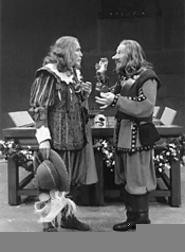With Cyrano de Bergerac's lyric verse and pomp, Rostand managed to express a universal truth: that we all find something about ourselves to hold us back. In the eponymous hero's case, it's that immortal proboscis, a nose like no other.
This is a character who has endured a multitude of adaptations, including Steve Martin's terrific updating in Roxanne. Now, the Cleveland Play House opens its season with Frank Langella's Cyrano. This miniaturized adaptation appropriately initiates the Baxter Stage, an intimate venue that is a much-needed addition to the Play House.
The actor-adapter's twin objectives were to make this huge play more manageable and to universalize it by removing it from its historical context. The Play House has wisely restored its Three Musketeers 17th-century ambiance. Here, 17 actors adroitly fill in for the original play's multitudes. As far as spectacle is concerned, the theater has pulled off a masterful subterfuge. The production is imbued with the illusion of epic plush, suggesting the rococo operettas that dazzled our Broadway-going forebears. Rarely has the Play House been privy to such a bounty of graceful ruffles, bouncing curls, russet falling leaves, and picture-book moonlight. Swords flash with a silvery sheen, heaving bodices fill the stage, and a mouthwatering array of varnished pastries titillate audience palates. The evening's sensuous pleasures call up a 1660 issue of Vogue brought to awe-inspiring life.
However, when the play's hypnotic lushness wears off, you'll note that, in spite of Ariel Goldberger's ingenious set, Rick Paulsen's painterly lighting, and David Kay Mickelsen's sumptuous costume design, audiences are strangely unmoved. It's a baffling phenomenon to see so many spectators dry-eyed at theater's most potent tearjerker. It's like leaving a Lassie movie indifferent to dogs: Something is seriously amiss.
Cyrano is the Superman of theater, a character adored particularly by young audiences. He is the personification of strength and nobility, whose life is marred by one tragic flaw. Effortlessly killing a hundred soldiers to protect a poet friend, slipping across a battlefield to deliver a love missive, spurning death itself to keep a rendezvous, and finally offering up his panache to God, he is the embodiment of the heroic spirit. In any fully realized presentation, he should send audiences into paroxysms of tearful ecstasy.
Yet this production is strangely unmoving. It would be unfair to pin the blame on Jamie Horton's long-nosed adventurer. Though lacking that rare magnetism that utterly conquers an audience, he has technical finesse, verbal agility, and flair to render Rostand's verbal music supple and true.
We must turn to director Peter Hackett to explain the ennui that spreads through the audience. He has staged the play like one of those grand automated clocks that amused French royalty. His actors are wound like painted mechanical dolls, performing a graceful but lifeless puppet play. Theoretically, the Baxter is ideal for bringing performers into close-up; ironically, that very alchemy is missing here. In spite of radiant stage pictures that seem to be angling for space in the Louvre, the production lacks a sureness in utilizing this new stage. Those sitting in the wrong section are left out of key scenes and spend an unfortunate amount of time pondering the back of Cyrano's plume and the shimmer of Roxane's cape. Thinking back on the evening's two and a half hours, one may have an easier time relishing a bold lighting effect, a glowing window, or a falling leaf than a pungently delivered phrase, a telling scene, or an expressive face.
The large supporting cast never squanders an opportunity to be picturesque. Melinda Page Hamilton is appealing, but lacks the necessary presence as the infuriatingly obtuse Roxane. Rostand has created little more than a stick figure, and Hamilton fails to give the character flesh and blood until the final scene. The always dependable Andrew May brings a silky James Mason joie de vivre to the villainous De Guiche. We have to take the much-mentioned irresistibility of David Furr's Christian on faith.
In spite of announcements that the audience was to remain seated until intermission, one determined older gentleman, pampering his bladder, attempted to make a beeline to the men's room during one of the play's countless altercations. Coming within inches of being impaled by one of His Majesty's guards, he became the evening's one undisputed moment of spontaneity.


